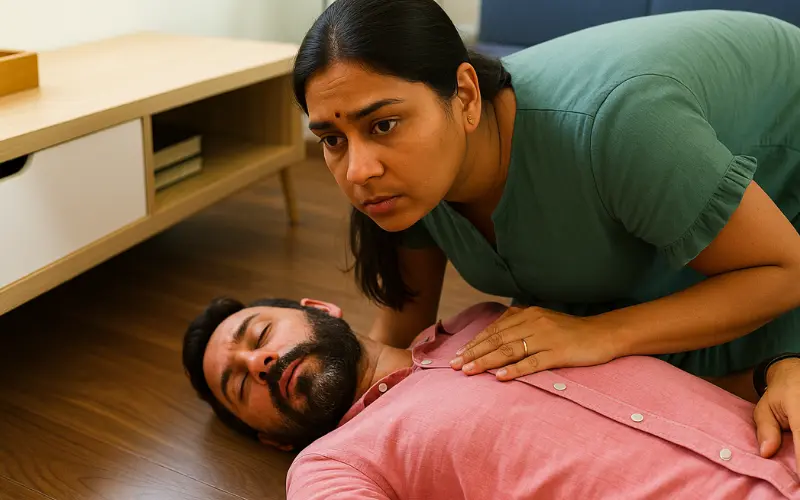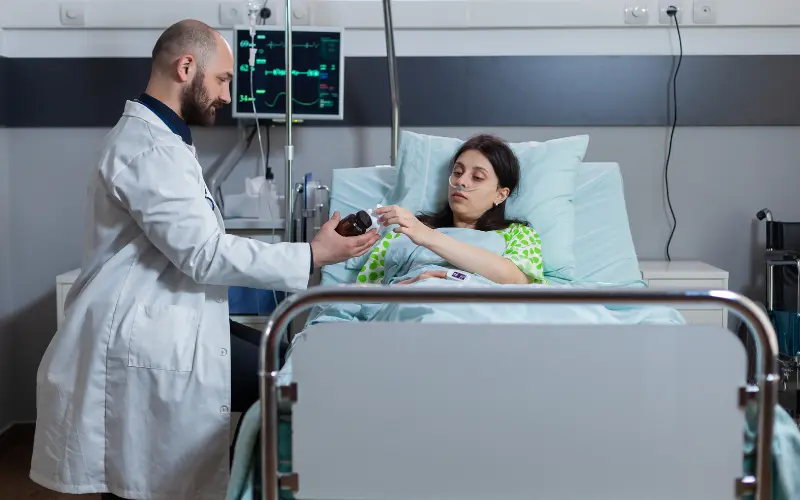Swallowed Poison? 9 Emergency Moves to Survive!

REVIEWED BY DR. SHOKET ALI (MD MEDICINE) on 29 october 2025.
Swallowed something you shouldn’t have? Or maybe someone around you has just done so?
It’s scary, your mind races. You’re not sure what to do. Should you make yourself throw up?
Drink some water or milk? Wait and see if it gets better.
Most people panic and do the wrong thing, not intentionally, but because they simply don’t know better. And when it comes to poison, those first few minutes really matter.
This guide will walk you through 9 simple steps you can take right away. What to do. What not to do. And when it’s time to get emergency help. Because knowing the right steps can save a life, maybe even your own.
The First Few Seconds: Why Your Reaction Matters More Than You Think

When someone swallows poison, it’s natural to panic. Your brain goes into fight-or-flight mode, and you want to act fast. But what you do in the first few minutes can make all the difference. And unfortunately, most people do the wrong thing.
They try to vomit. They give milk. They wait, hoping the symptoms will go away.
These might seem like the right moves, but they can actually make things worse.
Here’s why:
- Vomiting can cause more harm, especially if the poison is corrosive.
- Milk or water might help in some cases, but in others, it spreads the poison faster.
- Waiting too long delays treatment, and with poisoning, time really matters.
Instead of guessing, you need to stay calm, think clearly, and take the right steps.
Spot the Signs: Symptoms That You or Someone Has Swallowed Poison

Sometimes, it’s easy to tell. You see someone drink something dangerous. You find a child near an open bottle of cleaner. Or someone tells you they took the wrong medicine.
But other times, it’s not so clear. That’s when you need to spot the symptoms quickly.
Here are common signs that could mean someone has swallowed poison:
Physical symptoms:
- Nausea or vomiting
- Burns or redness around the mouth and lips
- Trouble breathing
- Drooling or foaming at the mouth
- Chest pain or stomach cramps
Changes in behavior:
- Confusion or acting strangely
- Drowsiness or extreme tiredness
- Seizures
- Fainting or not responding
In children or older adults, signs can be harder to spot. They may just seem sleepy, irritable, or not like themselves.
Some poisons act slowly, and symptoms may take time to show up. So even if the person looks fine, do not wait. Act quickly and treat it as an emergency.
What To Do Immediately (Before Help Arrives)

If someone has swallowed poison, every minute matters. Here’s what you should do right away, even before medical help arrives.
1. Stay calm and keep the person calm.
Panicking can make things worse. Speak slowly, keep them still, and try to comfort them.
2. Don’t make them vomit.
Forcing someone to throw up can cause more damage, especially if the substance is corrosive or foaming.
3. Don’t give anything to eat or drink unless a medical expert says so.
Water or milk may seem helpful, but in some cases, they can help the poison spread faster through the body.
4. Check for symptoms.
Look for signs like trouble breathing, confusion, or unconsciousness. These will help doctors act faster.
5. Find the poison source.
If possible, get the container, label, or anything the person swallowed. This helps medical teams identify the poison quickly.
6. Call emergency services immediately.
Dial 108 or your local emergency number. Be ready to tell them:
- The person’s age and weight
- What was swallowed and how much
- When it happened
- Any symptoms you see
7. Follow their instructions exactly.
Do not try home remedies or guess what might work. The emergency team will guide you based on the situation.
8. Keep the person still and upright.
If they are awake, help them sit up to prevent choking. If they are unconscious but breathing, place them on their side.
9. Stay with the person until help arrives.
Keep monitoring their breathing and responses. If they stop breathing, be prepared to start CPR if you know how.
Types of Poison and What Changes in Each Case

Not all poisons are the same. The substance someone swallows can completely change what needs to be done next. Here are some of the most common types and how to handle each one.
1. Household Cleaners
Things like bleach, toilet cleaner, or floor disinfectants are often corrosive. They can burn the mouth, throat, and stomach.
Do not try to make the person vomit, as it can cause more damage on the way back up. Keep them upright and call for emergency help right away.
2. Pesticides and Insect Killers
These are highly toxic and can affect breathing, heart rate, and brain function. Symptoms might show up quickly or slowly, depending on the poison.
Avoid giving food or water unless a medical professional advises it. Try to keep the product container or label to show the doctor.
3. Medicine Overdose
Swallowing too many pills, whether by accident or on purpose, can be dangerous.
Common examples include painkillers or sleeping pills. Symptoms might not appear right away, but internal damage can still happen. Write down the medicine name and how much was taken, then call for help.
4. Poisonous Plants
Some houseplants or garden plants can be toxic if eaten, especially by kids. Chewing on leaves or berries can lead to nausea, drowsiness, or even seizures. Bring a piece of the plant or take a photo to help doctors identify it.
5. Alcohol or Substance Poisoning
This includes too much alcohol, hand sanitizers, or unknown substances.
Watch for signs like slow breathing, vomiting, or unresponsiveness. If the person is unconscious but breathing, place them on their side and stay with them. Call for emergency help immediately.
Each of these cases needs a different approach. Knowing what was swallowed will help doctors give the right treatment quickly.
When It’s Time to Go to the Emergency Room
Not every poisoning case looks serious in the beginning. But some signs should never be ignored.
If you notice any of the following symptoms, go to the emergency room immediately.
- Trouble breathing or shortness of breath
- Fainting, unresponsiveness, or not waking up
- Seizures or unusual body movements
- Burns or redness around the mouth
- Vomiting blood, severe stomach pain, or chest pain
- Swallowed a known toxic substance, even if there are no symptoms yet
How to Prevent Accidental Poisoning in the First Place

Poisoning can happen in seconds, often when you least expect it. A little preparation can go a long way in keeping your home safe, especially if you have children or elderly family members.
- Keep all cleaning products, chemicals, and medicines locked away or out of reach
- Never transfer chemicals or cleaners into food or drink containers
- Use clear labels and warning signs on anything that could be harmful
- Teach children not to touch or taste unknown items
- Store medicines in the original packaging with proper instructions
- Check expiry dates and safely dispose of expired products
- Keep emergency contact numbers visible and easy to access
- Build a basic first aid kit and know how to use it
Prevention is easier than emergency treatment. Make your home poison-safe today, so you don’t have to react tomorrow.
Frequently Asked Questions
1. Can milk help if someone swallows poison?
Not always. Milk may seem helpful, but in some cases, it can make the poison spread faster. Only give milk if a doctor or poison control expert recommends it.
2. What if the person is unconscious?
Do not give them anything by mouth. Call emergency services immediately. If they are breathing, gently roll them onto their side. If they stop breathing, begin CPR if you’re trained to do so.
3. Can I induce vomiting with saltwater or by sticking fingers in the throat?
No. Inducing vomiting can cause more harm, especially if the poison is corrosive. It can burn the throat or lungs on the way back up. Never make someone vomit unless instructed by a medical professional.
4. What should I tell emergency responders?
Be ready to share the person’s age, weight, what was swallowed, how much, and when it happened. If possible, keep the product or medicine container to show the medical team.
Struggling with same?
Book Your Appointment With Our Expert Doctors

Conclusion:
Swallowing poison is terrifying, but knowing what to do can keep things under control. Most people panic or try home remedies, which often make things worse.
Now you know the signs to look for, the steps to take, and the mistakes to avoid. Whether it’s a child, an adult, or even yourself, acting quickly and correctly can save a life.
Raja Hospital has a fully equipped emergency team available 24 hours a day to treat poisoning cases quickly and safely. Getting help early can make all the difference.
